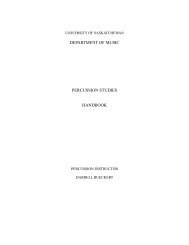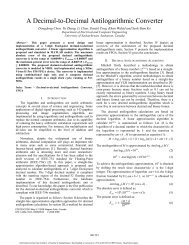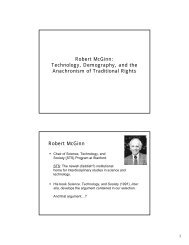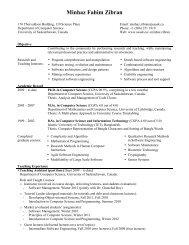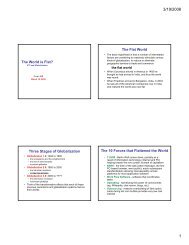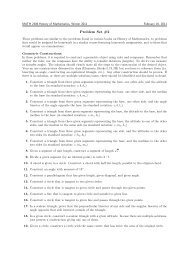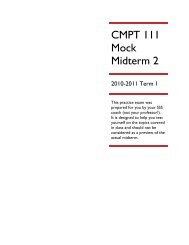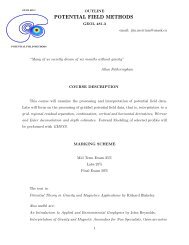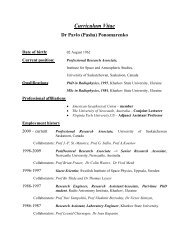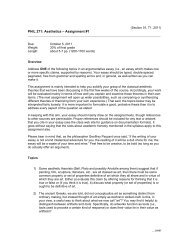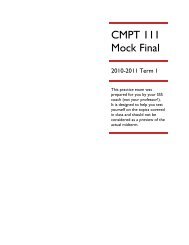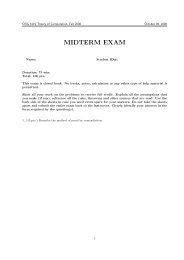Water Resources Engineering - Homepage Usask
Water Resources Engineering - Homepage Usask
Water Resources Engineering - Homepage Usask
Create successful ePaper yourself
Turn your PDF publications into a flip-book with our unique Google optimized e-Paper software.
W3. SOCIAL, POLITICAL AND INSTITUTIONAL ASPECTS OF WATER ENGINEERING<br />
(KUL-code: I792)<br />
Lecturer: PETERS J.J.<br />
Contact hours: 30 hrs. of practical<br />
Prerequisites: No<br />
Time and place: 2nd semester, 5 sessions of 3 hours each, K.U. Leuven<br />
Course syllabus: Some reference work and few lecture notes<br />
Evaluation: Through an oral presentation of a case study, preferably situated in the student’s home<br />
country<br />
Comparable handbook: No comparable handbook available<br />
Additional information:<br />
Learning objectives:<br />
The aim of the workshop is to make the students better aware about the variety of problems and issues related to<br />
the social, political and socio-economic aspects of water resources development projects and of water resources<br />
management, including the institutional aspects. Purely financial and economic aspects are not included.<br />
Course description:<br />
The course orientation is based on the lecturer’s experience in a large variety of water resources projects,<br />
showing how, why and when the approach to these aspects has failed or succeeded. The workshop aims at<br />
developing the consciousness of the students about the role of the various “actors” in relation to water resources<br />
systems development and management. It also aims at showing how politics may affect the so much needed<br />
sustainable, integrated WR management, and the implementation of WR development projects. It should make<br />
the students aware of the social implications of WR engineering projects, either the direct or the indirect ones,<br />
eventually through an environmental impact. It is important for the student to realise that it is not possible to<br />
dissociate the various aspects: social, political, socio-economic, and institutional.<br />
The workshop starts with descriptions, with the following:<br />
1. Definitions: What is a water resource (WR)? How to define a WR system on which to work/engineer<br />
(description, limits)? What do we call engineering, management, development?<br />
The accent is put on the way each society is having its own view, its own approach, depending on the 3<br />
factors: availability of water resources, of financial resources and awareness about the water issue.<br />
2. Presentation by the lecturer and discussion of some results, conclusions and recommendations by<br />
international organisations (Mar del Plata 1977, Rio de Janeiro 1991, EU-SAST 6 - 1992, 1991 WMO-<br />
UNESCO report on <strong>Water</strong> <strong>Resources</strong> Assessment Activities, etc.), all which he contributed to, but the first.<br />
3. Presentation and discussion by the lecturer of case studies in Asia, Africa and South America. These cover<br />
a large variety of situations, such as lakes, coastal areas, large and small rivers, master plan studies, floods<br />
and droughts, fluvial problems, water development, irrigation schemes, conjunctive use projects, etc.<br />
Special attention is paid to aspects such as correct problem definition, setting up relevant Terms of<br />
Reference, multi-disciplinary approach. For this part, he illustrates with slides, photographs and video,<br />
among which “After the Floods” (BBC Horizon). He personally contributed to this last video by inviting<br />
the BBC to a workshop he organised in 1993 in Bangladesh.<br />
4. Presentation by the students of projects or case studies, preferably case studies in which they have been<br />
actively involved. All presentations are short, and always followed by lively discussions and possibly<br />
confrontations.<br />
19 / Course syllabi



